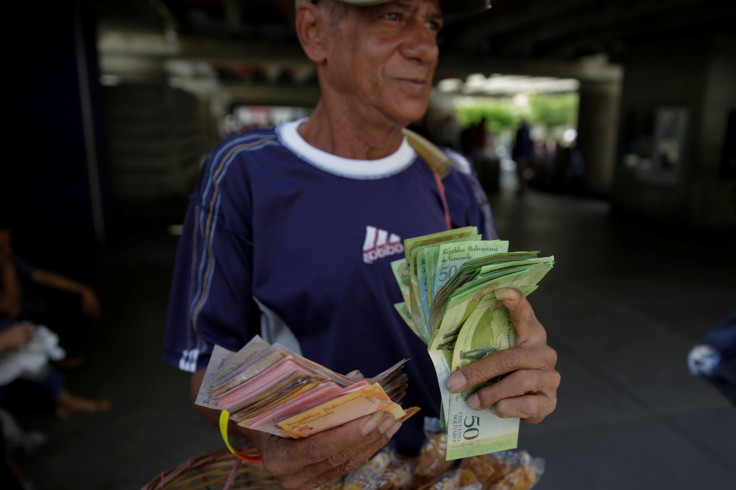Venezuela Crisis: Bitcoin Seen As More Stable Alternative Amid Surge In Inflation, Banknote Chaos

Amid the country’s mounting economic crisis, Venezuelans are increasingly turning toward digital currency bitcoin to mitigate the effects of surging inflation. The country’s inflation is expected to rise to 1600 percent in 2017, the International Monetary Fund has said. To try and combat the problem of citizens needing bags full of cash to buy daily necessities, Venezuela’s Central Bank announced earlier this month that it was going to release higher-value banknotes.
But free from the strict controls of foreign currency exchange imposed by the central bank and the unpopular government of President Nicolas Maduro, a growing number of Venezuelans are viewing bitcoin as a safer alternative, the Guardian reports. Users of the exchange website Surbitcoin.com, which allows users to buy and sell the currency in Venezuela, increased from just 450 in August 2014 to more than 85,000 as of last month.
Since its introduction in 2009, Bitcoin has been far more volatile against the US dollar than other major currencies. Yet it is still considerably more stable than the Venezuelan bolivar, which lost two-thirds of its value against the dollar on the black market in November, its biggest ever monthly decline, according to data from DolarToday, which tracks the black-market rate.
One hundred bolivars is currently worth just two cents.
While some Venezuelans view bitcoin as a much safer currency for their savings, others use it simply as a way to buy food or medicine. Since the country became engulfed in an economic crisis spurred by the rapid decline in global oil prices in 2014, Venezuelans have struggled to purchase basic supplies, with supermarket shelves often completely empty and thousands crossing the border with Colombia to purchase necessities.
Thus far the move to issue new banknotes has only caused further chaos. New banknotes of up to 20,000 bolivars in value were due to go into circulation on Thursday, replacing the 100 bolivar note as the highest value note. However, on Friday they had not yet arrived.
Meanwhile, the government has declared that the 100 bolivar note is no longer legal tender and given people only 10 days to exchange the note for 100 bolivar coins. The announcement has led to huge lines outside banks and to protests in several cities. Maduro also ordered the border with Colombia to be closed for 72 hours from the time the 100-bolivar notes ceased to be accepted.
© Copyright IBTimes 2025. All rights reserved.





















